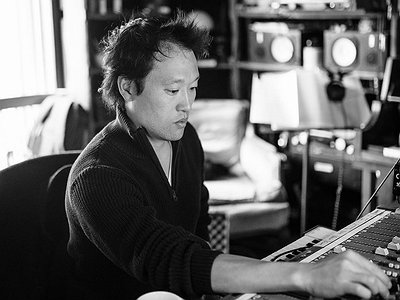Part 1
Name: Sun Chung
Nationality: USA
Occupation: Producer/Owner Red Hook Records
Current Release: Hanamichi by Masabumi Kikuchi
Recommendations: My Funny Valentine by Miles Davis. To me, this is the epitome of intuition and telepathy between improvising musicians. / Hanamichi by Masabumi Kikuchi, it represents so perfectly the culmination of a lifetime of dedication to his craft.
Red Hook Records has a basic landing page and a Facebook page.
When did you start with your own label - and what or who were your early passions and influences? What was it about music and/or sound that drew you to it?
Red Hook Records launched in late 2020. Our first release came out on April 16th, 2021, one by the late pianist Masabumi Kikuchi entitled Hanamichi – The Final Studio Recording.
I would say that my father was my earliest musical influence. He is a classical pianist and conductor, and as a child, I often woke up in the morning to the sound of the piano or a recording. So, I was quite immersed in music from the very beginning, and I feel that being exposed so early allowed me to develop a sensibility towards sounds.
My musical taste has been ever-evolving since. In my early teens, I listened to a lot of blues, rock, alternative music and then gravitated more towards jazz and electronic music. I realized at some point that the emotional/spiritual elements of music could be as strong and varied regardless of the genre; that different music just serves different purposes.
For most artists, originality is preceded by a phase of learning and, often, emulating others. What was this like for you: How would you describe your own development as a label curator and the transition towards your own approach?
Getting into music production and starting a label was a gradual process; a lot of trial and error was involved. I started playing guitar in my teens and majored on the instrument for my undergraduate studies. However, as time passed, I realized that I never really felt at home performing on stage and preferred writing music on my own. So around 2008, I decided to pursue this path and started my master's in composition at New England Conservatory. Around that time, I also gravitated to music production which felt like a natural extension to writing. In 2012, I was hired by ECM Records as a producer, and I worked there up until mid-2020. During my time at the label, I got the chance to learn the ins and outs of being a producer. I had the opportunity to spend a lot of time in studios, with engineers, and learned a lot from Manfred Eicher, who created one of the most iconic record labels. All these past experiences crystallized in Red Hook Records, which also gives me the opportunity to express what I have learned.
How do you feel your sense of identity influences what music you feel passionate about and what you release?
I would say that the music I listen to is completely influenced by my sense of identity. I tend to be more on the quiet side and not socialize much, so this overlaps with my musical taste and choices. Not surprisingly, I gravitated towards a lot of ECM music and ended up producing music for them for over eight years.
What were your main label challenges in the beginning, and how have they changed over time?
The main challenge of a new record label is to establish an identity. Figuring out the label’s musical identity is of course the priority but the visual component must also be carefully considered. It is not only about releasing incredible music but also to be able to create a dialogue between the performance and the object (the record) that makes it accessible over time.
Another challenge for a new record label is to find good distribution and remain financially viable. However, I feel that these are consequential to creating a solid label identity. As for Red Hook Records, the main pieces of building a record label are in place for us, so now it's a matter of putting them to work.
How do you see the role of labels in the creative process? What is the scope, and what are the limitations of what you are capable of doing?
The role of the label is to offer the artists a creative challenge to push their boundaries and create something that would not be possible in any other circumstances.
Generally speaking, there are two categories of record labels. On the one hand, there are those that release already made records that the artists bring to the table, and on the other, there are those that produce in-house most of their releases. We are definitely in the latter category.
We do everything from A to Z. From carefully selecting musicians to work with, do all the necessary pre / post-production work, to finding the best manufactures and distributors to release our work. It's undoubtedly more time-consuming and a more expensive way to work but, in the end, more rewarding.
Whom do you feel your obligation to – the artists, the buyers, your own demands in terms of quality?
If the label and artist are genuinely convinced about the quality of the album, usually the listeners are too.
What are the most important conclusions you've drawn from the changes in the music, music-PR and music-journalism landscape? How do they affect labels in general and your own take on running a label in particular? What role does social media play for your approach?
Publicity is, of course, an integral part of a label. That being said, I haven't personally looked into this area so much in detail. I focus most of my time on the production of the music. So in regards to publicity, I prefer to work with great publicists and let them do what they do best.





